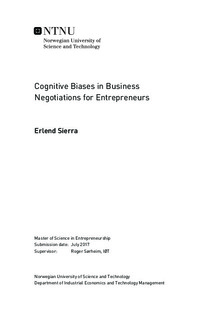Cognitive Biases in Business Negotiations for Entrepreneurs
Master thesis
Permanent lenke
http://hdl.handle.net/11250/2481079Utgivelsesdato
2017Metadata
Vis full innførselSamlinger
Sammendrag
The purpose of this master thesis is to investigate what role cognitive biases play in business negotiations for entrepreneurs, through conducting a theory building empirical study in an exploratory manner. The purpose is achieved through performing a qualitative empirical study of entrepreneurs, before creating a synthesized conceptual framework which incorporates the most relevant theoretical and empirical findings from the study conducted in this thesis.
A qualitative case study research method is chosen for the thesis, with a data collection approach through semi-structured interviews of 8 individual entrepreneurs, selected through defined criteria relating to entrepreneurial experience. The study employs an abductive approach, where the preliminary theoretical framework guides interpretation of the empirical data collected, while also enabling a revision of assumptions underlying the framework, or exploration of other literature which might illuminate uncategorized findings. The finalized conceptual framework is utilized to answer the research questions and purpose of the thesis.
The study has shown that cognitive biases in business negotiations are quite prevalent, with a duality of usefulness in how they can affect the negotiating actors. Certain biases like the framing, overconfidence and anchoring bias, appear as essential tools to the negotiating entrepreneur, while the study also has found a general lack of awareness regarding these and other cognitive biases. As both theoretical and empirical findings indicate that entrepreneurs have a high susceptibility to cognitive biases, it is further implied that they are significantly affected by such biases throughout all stages of the negotiation process. In conclusion, the entrepreneurs have also been found to exhibit a long-term strategic perspective extending beyond single negotiations, implying that cognitive biases affect negotiations over time.
The thesis is thought to have developed, extended and created new knowledge across the topics of negotiation, cognitive biases and entrepreneurial cognition, while also accentuating recommendations for future areas of research. In this regard, the combined body of research in this thesis has arguably given rise to a wider understanding of cognitive biases in relation to both the negotiation context in general, as well as for negotiating entrepreneurs specifically.
